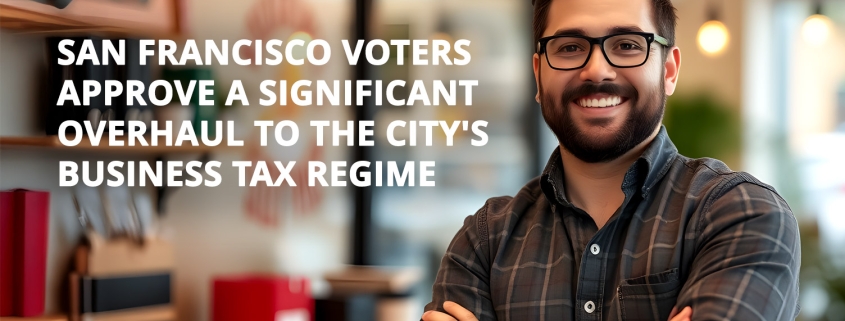San Francisco Voters Approve A Significant Overhaul To The City’s Business Tax Regime
San Francisco Voters Approve A Significant Overhaul To The City’s Business Tax Regime
On November 5, 2024 voters in San Francisco approved Proposition M (“Prop. M”) which aims to exempt more small businesses from taxes and fees, while reducing taxes on some of the city’s largest companies.
Currently, San Francisco taxes businesses operating in the city based on the number of employees working in San Francisco. Such method of calculation creates a disincentive to bring employees back from remote work back into the office. Prop. M’s adjustments are meant to change that and help revitalize downtown San Francisco.
What is the impact of Prop. M?
Prop. M, cuts taxes on several of the city’s largest employers and increases the number of small businesses exempt from business taxes and certain licensing fees. It also overrides scheduled tax increases for small businesses until at least 2027.
More importantly, Prop. M makes major changes to how business taxes are calculated for individual companies, such as shifting from a tax formula focused on payroll to one on “gross receipts” or sales in San Francisco. This new method of calculation is commonly used by cities all over the country in determining local taxes on businesses and is referred to as a “gross receipts tax”.
In addition to the gross receipts tax applicable to all businesses, an annual additional graduated tax on the gross receipts of ride-hailing companies such as Uber and Lyft and companies that offer rides in driverless cars such as Waymo, will be levied to help fund the city’s transit system.
Prop M. also mandates other changes such as discontinuing the charge of fees to businesses that occupy sidewalks with tables and chairs and reducing the number of business tax classifications from 14 to 7.
Proponents of Prop M. claim that more employees will likely return to the office and work remotely less frequently, because companies would not face a higher tax burden for having employees work in San Francisco. Also, companies might be less likely to leave San Francisco because, even if they moved their headquarters out of the city, their sales would still get taxed.
What should you do?
Whether it is San Francisco, a State or the Federal government, new administrations and changing times usually result in changes to the tax laws. Tax changes with their nuances and complexities can be difficult to navigate alone. At the Law Offices Of Jeffrey B. Kahn, P.C. our tax attorneys are always thinking of ways that our clients can save on taxes, trusts and estates planning, and probate matters. The tax attorneys at the Law Offices Of Jeffrey B. Kahn, P.C. located in Orange County (Irvine), San Francisco and elsewhere in California are highly skilled in handling tax and probate matters and can effectively represent at all levels with the IRS and State Tax Agencies including criminal tax investigations and attempted prosecutions, undisclosed foreign bank accounts and other foreign assets, and unreported foreign income. Also, if you are involved in cannabis, check out what our cannabis tax attorney can do for you. Additionally, if you are involved in cryptocurrency, check out what a bitcoin tax attorney can do for you.


 Follow
Follow Follow
Follow
